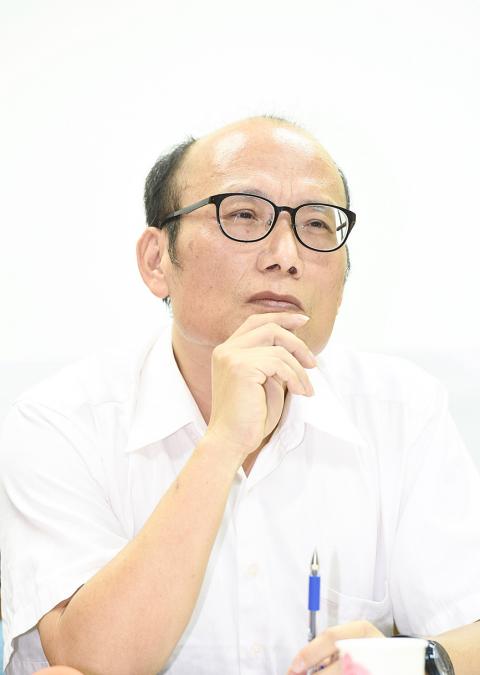History professor Wu Kun-tsai (吳昆財) on Monday said that he would initiate a referendum in 2020 to reintroduce Chinese history content that was removed from new high-school curriculum guidelines, the Chinese-language China Times reported yesterday.
Work to prepare the referendum proposal has already begun and the tentative referendum question is: “Do you agree the history curriculum for high schools should be changed back to how it was traditionally?” the newspaper quoted Wu as saying.
He plans to begin collecting signatures for the referendum in April, when he would have obtained more resources and support, and to hold the referendum in 2020 alongside the presidential and legislative elections, it said.

Photo: Peter Lo, Taipei Times
Wu is a leading figure in a campaign to “save Chinese history” launched last month by a group of history teachers.
The group has opposed a new history curriculum the Ministry of Education approved in August that adopted a theme-based approach and made Chinese history part of a theme called “China and East Asia,” with the other two themes being “Taiwan and the World” and world history.
The new curriculum, which is to be implemented in the next academic year, has been described by the group as an attempt to “desinicize” Taiwan. It is in stark contrast to the current, or traditional, version, which requires students to learn Chinese history in a strict chronological order from prehistory.
The ministry has defended the new curriculum, saying that it would enable students to “not only learn about Chinese history, but develop a structured and rich understanding of its connections to global history.”
Many opponents of the new curriculum had as early as August suggested launching a referendum on the issue, but the plan was postponed as it needed more time and resources, Wu was quoted as saying.
By holding the referendum alongside the presidential election, he hopes to urge presidential candidates to clarify their stance on “whether future generations should study Chinese history,” a question he said is closely related to national status and cross-strait policies.
He understands that referendums are expensive and energy-consuming, but they are “the last resort to protect popular sovereignty,” Wu was quoted as saying.
“The nation should be run by experts. That the public has to hold a referendum to decide policy directions shows that the government is failing. If everything has to be solved by referendum, what do we want a government for?” he was quoted as saying.

An essay competition jointly organized by a local writing society and a publisher affiliated with the Chinese Communist Party (CCP) might have contravened the Act Governing Relations Between the People of the Taiwan Area and the Mainland Area (臺灣地區與大陸地區人民關係條例), the Mainland Affairs Council (MAC) said on Thursday. “In this case, the partner organization is clearly an agency under the CCP’s Fujian Provincial Committee,” MAC Deputy Minister and spokesperson Liang Wen-chieh (梁文傑) said at a news briefing in Taipei. “It also involves bringing Taiwanese students to China with all-expenses-paid arrangements to attend award ceremonies and camps,” Liang said. Those two “characteristics” are typically sufficient

A magnitude 5.9 earthquake that struck about 33km off the coast of Hualien City was the "main shock" in a series of quakes in the area, with aftershocks expected over the next three days, the Central Weather Administration (CWA) said yesterday. Prior to the magnitude 5.9 quake shaking most of Taiwan at 6:53pm yesterday, six other earthquakes stronger than a magnitude of 4, starting with a magnitude 5.5 quake at 6:09pm, occurred in the area. CWA Seismological Center Director Wu Chien-fu (吳健富) confirmed that the quakes were all part of the same series and that the magnitude 5.5 temblor was

The brilliant blue waters, thick foliage and bucolic atmosphere on this seemingly idyllic archipelago deep in the Pacific Ocean belie the key role it now plays in a titanic geopolitical struggle. Palau is again on the front line as China, and the US and its allies prepare their forces in an intensifying contest for control over the Asia-Pacific region. The democratic nation of just 17,000 people hosts US-controlled airstrips and soon-to-be-completed radar installations that the US military describes as “critical” to monitoring vast swathes of water and airspace. It is also a key piece of the second island chain, a string of

The Central Weather Administration has issued a heat alert for southeastern Taiwan, warning of temperatures as high as 36°C today, while alerting some coastal areas of strong winds later in the day. Kaohsiung’s Neimen District (內門) and Pingtung County’s Neipu Township (內埔) are under an orange heat alert, which warns of temperatures as high as 36°C for three consecutive days, the CWA said, citing southwest winds. The heat would also extend to Tainan’s Nansi (楠西) and Yujing (玉井) districts, as well as Pingtung’s Gaoshu (高樹), Yanpu (鹽埔) and Majia (瑪家) townships, it said, forecasting highs of up to 36°C in those areas